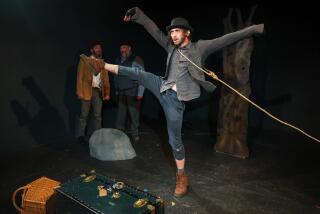Kaboodle Makes Great Theater From Little Kit
SAN DIEGO — I knew I was in the right place Thursday night as I stumped upa drafty flight of stairs on 8th Avenue, to a performance art joint called Sushi.
Call it kismet. Call it a hunch. I was on the trail of great theater, and all signs pointed to Sushi.
Sure enough, a limey stage company named Kaboodle was in residence. The seven-member troupe, with four actors, one musician, a stage manager and administrator, had the look of a lean, mean acting machine.
Their show, “Rasputin: The Forbidden Story,” is a pip, performed with the energy of two freight trains. The story of Rasputin, the mystic peasant monk of Siberia who charmed the empress of Russia, is one of the fantastic tales of the century, and the Kaboodle actors tell it with zesty abandon.
Today you hear about high-technology theater. This is low-tech theater: four actors, a musician and a trunk. With only a foot locker and a few other props and scenic pieces, the troupe becomes a thespian magic act, conjuring up the wastelands of central Russia, a steamer crossing the Atlantic, a boxing ring and a walk-in ice cream freezer. Using the foot locker and refrigerator with the precision of surgical devices, they create the unforgettable sights and sounds of a headlong rush to grab a moving train.
Their stock in trade is hilarity and a subversive approach that will make you forever question history books.
Kaboodle’s version of the Rasputin tale, based on a novel by Michel Tournier, claims the FBI suppressed the real story. As related by a hard-boiled reporter named O’Hara from the New York Enquirer, Rasputin did not die in St. Petersburg. Yes, he was poisoned, shot, trussed and thrown into the icy Neva River by a cabal of aristos from the imperial court. But, according to O’Hara, he was rescued.
A little Jewish man named Simonovich pulled Rasputin from the frigid waters, revived him, and the pair then fled, with more adventures, to America, only to be destroyed amid the swamps outside New Orleans.
Rasputin is a hoodoo mystic, all right, but instead of being a smooth operator, he goes with his natural, basic impulses a little like Mozart does in “Amadeus.” To him, war is a chump’s game, and that thought is a slap in the face to the court aristocrats, who believe otherwise.
But Rasputin was not around to write his history. The aristos wrote it, and, he tells us, they lied.
Actor Lee Beagley plays Rasputin the pilgrim as a scruffy-looking character, who admits he has a penchant for sex, but then, don’t we all? It’s a tough role, but Beagley makes the audience believe, whether cavorting with Paris hookers or comforting a bleeding and beaten New Orleans voodoo woman.
Beagley’s thespian partner, Steve Howe, plays Simonovich as a runty little survivor. Howe creates a mensch that is a tightly wound whirling dervish, spinning around the stage, at once alienating our affections while craving them. Howe gets my vote for one of the most energetic performances of the year.
Actress Denise Evans’ throaty voice suggests cigarettes, hard living and straight whiskey in her portrayal of the no-nonsense O’Hara, who tracks Simonovich to a death row cell in Louisiana.
Kelly Aiken, wearing little more than a ratty slip, skillfully lines out an exotic assortment of women, from the empress of Russia to a nose-in-the-air English woman to a Paris prostitute and Queenie, the voodoo woman.
Stu Daye’s musical accompaniment on several guitars, a mandolin, keyboard and vocals offers subtle and often humorous support. A variety of music, from the “1812 Overture” to the old slave lament “Take This Message,” provides pointed comment.
O’Hara was right. There are a million stories in the city. Sometimes the story gets away. Sometimes you get the story. Sometimes the story gets you.
“RASPUTIN”
Written and directed by Lee Beagley. Music by Stu Daye. Production by the Kaboodle Theatre Company. With Lee Beagley, Steve Howe, Denise Evans, Kelly Aiken. At 8 p.m. today only. At 852 8th Ave., San Diego.
More to Read
The biggest entertainment stories
Get our big stories about Hollywood, film, television, music, arts, culture and more right in your inbox as soon as they publish.
You may occasionally receive promotional content from the Los Angeles Times.










